- Top
- Sustainability
- Response Based on the Taskforce on Climate-related Financial Disclosures (TCFD)
Response Based on the Taskforce on Climate-related Financial Disclosures (TCFD)


Introduction: Our Vision of Society
Our Group has various points of contact with customers, including food, clothing, housing, and financial services. We have about 85,800 stores worldwide which are visited by more than 63.6 million people every day. Our business rests on the pedestal of our position as part and parcel of the daily lives of customers. To make local communities sustainable, we have identified, as material issues,*1 social issues that should be solved in a priority manner through our main businesses. In our Medium-Term Management Plan 2021–25,*2 we have committed ourselves to the promotion of sustainable management.
Among the material issues, through our Response to Climate Change (3. Realize decarbonization, circular economy, and society in harmony with nature, through environmental efforts), we will undertake initiatives to prepare for and prevent climate change that threatens the daily lives of customers and local communities, such as natural disasters, which are increasing in number, and the procurement of product raw materials, which is becoming increasingly unstable. To accelerate these initiatives on material issues, in May 2019 we issued the “GREEN CHALLENGE 2050” environmental declaration,*3 which outlines a roadmap for the society we are aiming for in the years 2030 and 2050.
In this environmental declaration, we have set medium- to long-term goals in four fields—reduction of CO2 emissions, measures against plastic, measures against food loss/waste and for organic waste recycling, and sustainable procurement—toward a transition to three forms of society, namely, a decarbonized society, a circular economy, and a society in harmony with nature.
In scenario analyses in line with the recommendations of the Task Force on Climate-related Financial Disclosures (TCFD), we have identified the climate-change risks and opportunities relating to the realization of a transition to these three forms of society expected as of 2030 by business entity. We are studying measures to reduce the risks and maximize the opportunities and are promoting the linkage of these measures with management strategy. For details on analysis results, strategies based on these results, governance related to climate change, our risk management structure, and so on, please see the relevant sections on this page.
Transition Plan
Our Group announced the “GREEN CHALLENGE 2050” environmental declaration in 2019. In this declaration, we outlined a roadmap toward reducing CO2 emissions from our store operations in Japan to net zero in 2050 and also our aim to reduce CO2 emissions in the entire supply chain, including Scope 3. To promote these initiatives, we have incorporated environmental investment (expansion of solar panels, introduction of energy-saving equipment, etc.) in our management strategy in the Medium-Term Management Plan 2021–25.
We are scheduled to periodically update the roadmap relating to CO2 emissions to take account of scientific progress, regulations, and so forth. (Targets were revised upward in 2020 and 2021.)
Roadmap toward a decarbonized society
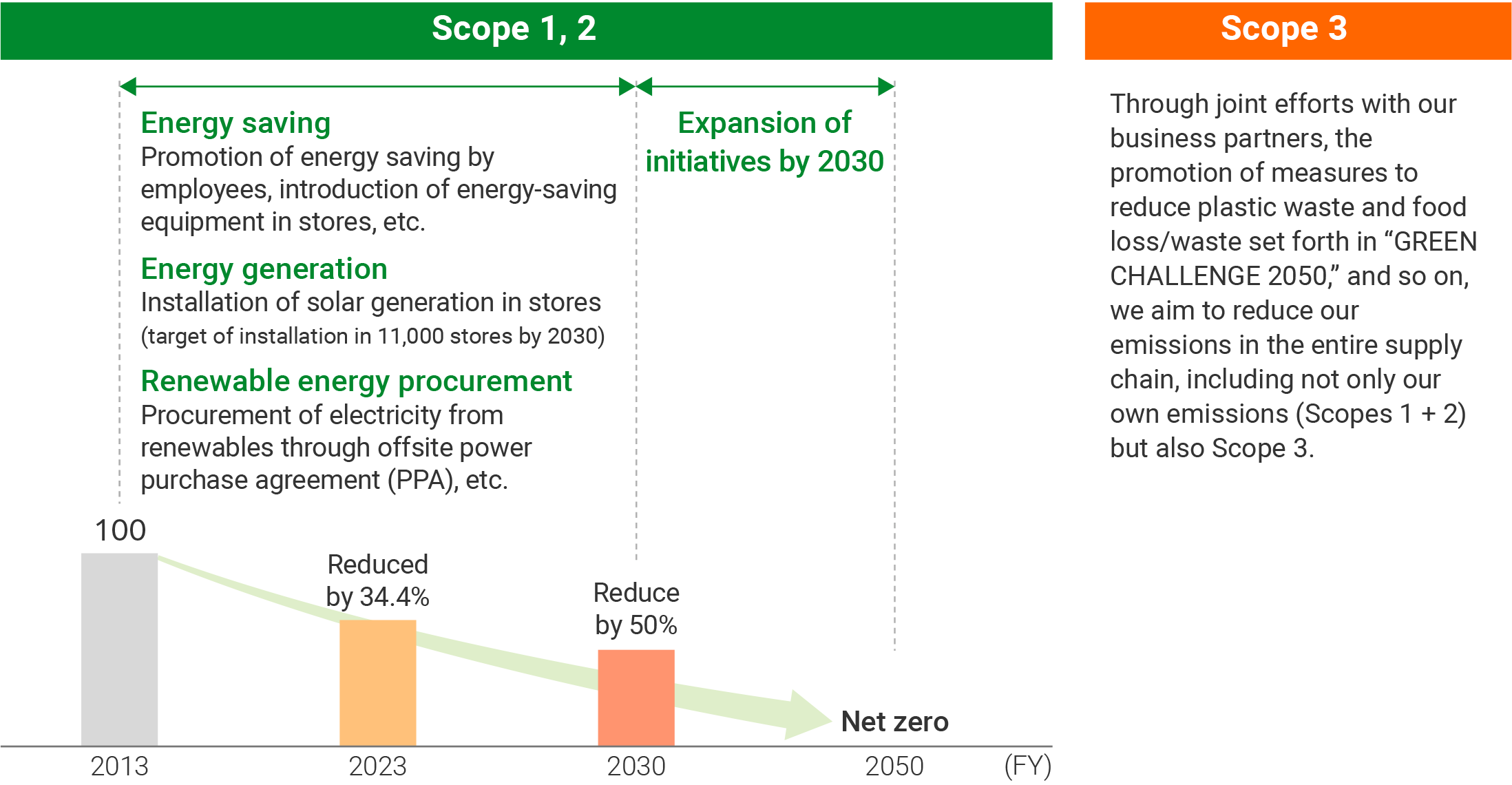
TCFD-Related Background and Future Implementation Plans
The Seven & i Group expressed our agreement with the TCFD recommendation in August 2019 and also joined the TCFD Consortium, established so that companies, financial institutions, and others can work together to promote initiatives. In FY2019–21 we implemented a scenario analysis targeting domestic convenience store operations (Seven-Eleven Japan) and disclosed the analysis results, enabling us to gain certain suggestions regarding risks peculiar to the convenience store operations. In the fiscal year ended February 28, 2023, as a domestic operation with the same geographical conditions, we implemented a scenario analysis of the superstore operations (Ito-Yokado, York-Benimaru, York) and disclosed the results. In the fiscal year ended February 29, 2024, 7-Eleven, Inc. conducted scenario analysis in the overseas convenience store (overseas CVS) business.
Through the analysis, we identified three major risks with significant financial impacts: carbon tax imposition, damage from natural disasters, and rising raw material costs. We recognize that these climate change risks are interrelated with nature. Climate change can lead to the degradation of nature, which in turn can exacerbate natural disasters and make it more difficult to procure raw materials. Additionally, the conservation of nature, such as forest preservation, can serve as a mitigation measure for climate change by maintaining CO2 absorption sources.
With this understanding, and considering the release of the Taskforce on Nature-related Financial Disclosures (TNFD) Framework V1.0 in September 2023, we will integrate our responses to climate change and nature. Moving forward, we will analyze and develop countermeasures from both perspectives.
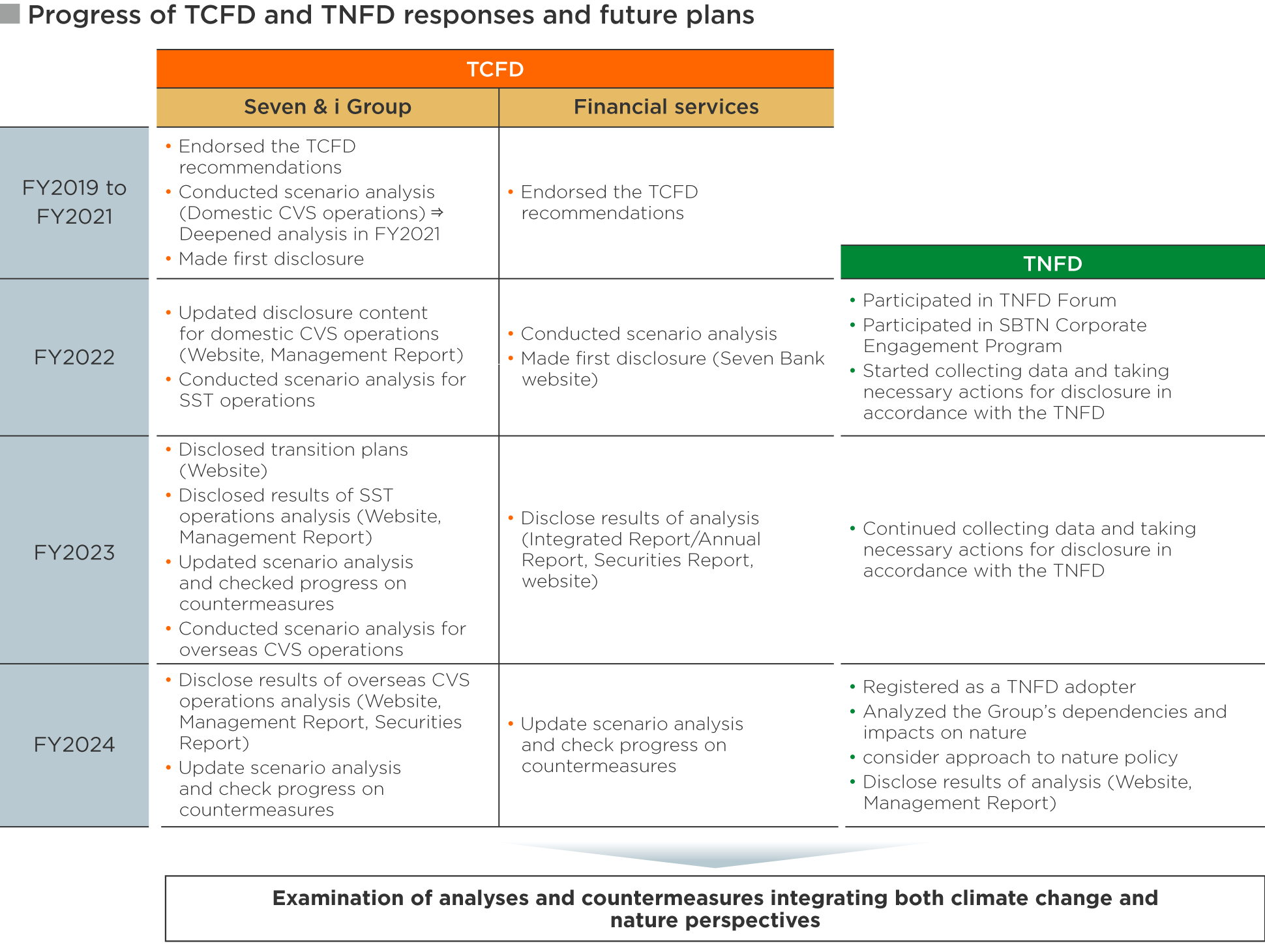
Below we explain the four disclosure categories recommended by the TCFD in the order of metrics and targets, strategy, governance, and risk management.
Metrics and Targets Related to Climate Change
In May 2019, the Group formulated its environmental declaration “GREEN CHALLENGE 2050.” In “GREEN CHALLENGE 2050,” we have set the following specific themes: reduction of CO2 emissions, measures against plastic, measures against food loss/waste and for organic waste recycling, and sustainable procurement. The goals are to achieve decarbonization, circular economy, and society in harmony with nature.
Toward the Paris Agreement’s goal for the world of limiting global warming to 1.5°C compared with pre-industrial levels, we have set the numerical targets of reducing CO2 emissions stemming from the Group's store operations to 50% compared with the FY2013 level in 2030 and to achieve net zero emissions in 2050. We have also set detailed numerical targets for other themes, and we are promoting initiatives for achieving them and monitoring their progress.
In the scenario analysis for each business entity, the substantial scale of damage due to natural disasters has become clear. Already in Japan as well, abnormal weather conditions are occurring, such as increases in localized torrential rain and typhoon damage, and many local governments have issued climate emergency declarations. In order to curb the risk of natural disasters caused by climate change, once again we renew our determination to collaborate with local communities and other stakeholders to make efforts to limit global warming to 1.5 degrees Celsius compared with pre-industrial levels by achieving the targets of “GREEN CHALLENGE 2050.”
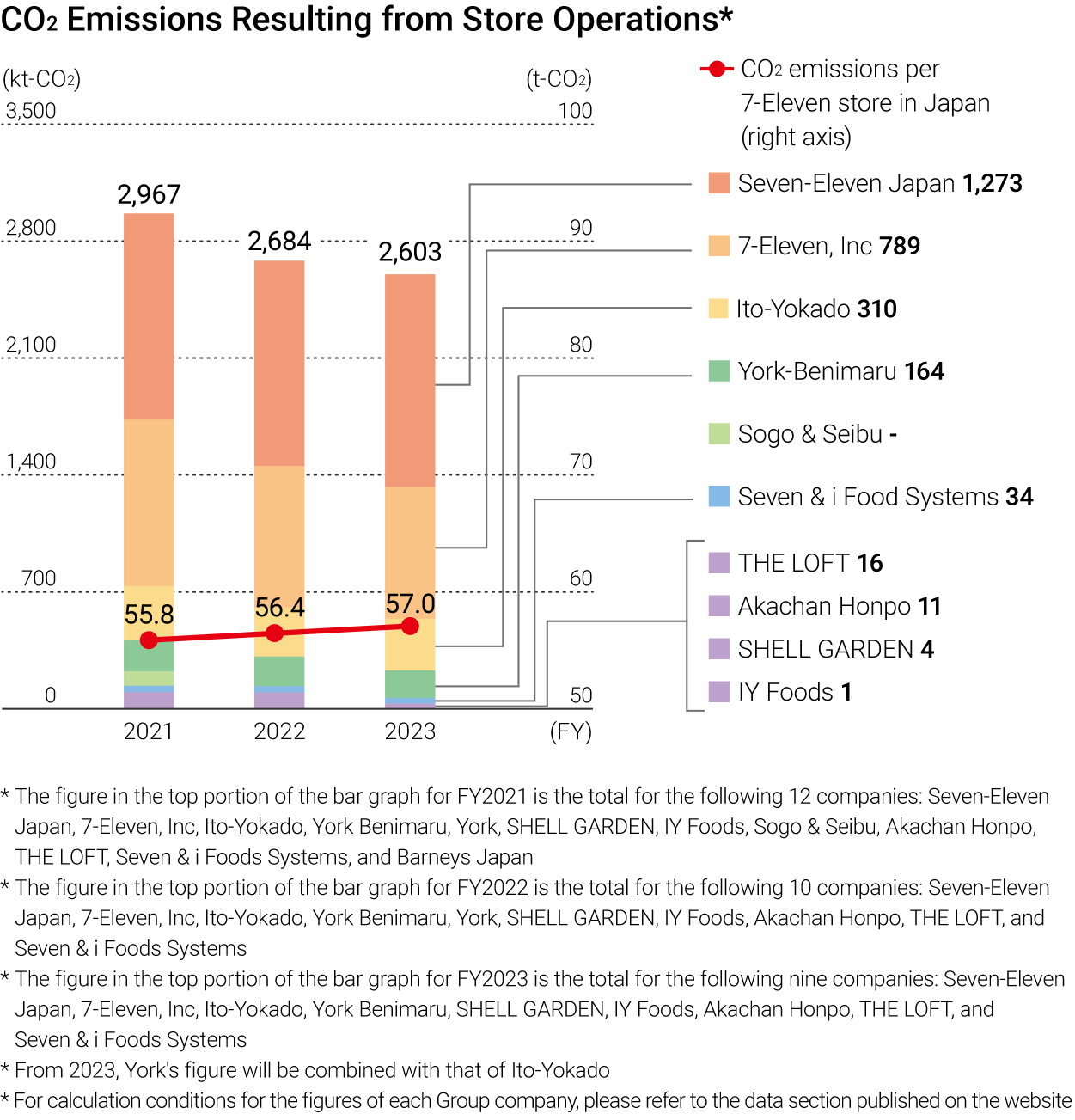
-
- *Calculated based on the Seven & i Holdings Environment-Related Data Calculation Report Manual stipulated in accordance with the Act on Rationalizing Energy Use and the Act on Promotion of Global Warming Countermeasures
Strategy: Implementation of Scenario Analysis
Scenario analyses based on the TCFD recommendations are implemented at the business entities of our Group.
<Analysis assumptions>
| Scenario |
Decarbonization scenario (1.5°C–2.0°C) / Warming scenario (2.7°C–4.0°C) * We set two scenarios with reference to reports on future forecasts issued by governments and international organizations, including STEPS, APS, and NZE2050, indicated in the World Energy Outlook of the International Energy Agency (IEA). |
| Analysis scope | In addition to the physical impact on stores, the analysis will cover costs in store operations and merchandise supply chain issues (raw materials, factories manufacturing merchandise, merchandise shipping) that significantly affect store operations, and customer behavior |
| Target year |
Domestic CVS operations, SST operations: Impact as of 2030 Overseas CVS operations: Short term (0–5 years), medium term (5–10 years), and long term (10–30 years) |
<Target business entities>
・Domestic CVS operations: Seven-Eleven Japan
・SST operations: Ito-Yokado and York-Benimaru
・Overseas CVS operations: 7-Eleven, Inc.
Scenario analyses at each business entity set two scenarios, a “decarbonization scenario (1.5°C–2.0°C)” and a “warming scenario (2.7°C–4.0°C),” with reference to reports on future forecasts and other materials issued by governments and international organizations, including STEPS*1, APS*2, and NZE2050*3, indicated in the World Energy Outlook of the International Energy Agency (IEA). We analyzed the impact of climate change taking account also of predicted business growth rates as of 2030.
*1 STEPS: Stated Policies Scenario. It is one of the scenarios shown in the IEA’s World Energy Outlook 2019 and reflects decarbonization policies and targets that had been publicized so far.
*2 APS: Announced Pledges Scenario. This scenario assumes that all climate-related commitments made by governments announcing long-term targets of net zero emissions are fulfilled in full and on time.
*3 NZE2050:Net Zero Emissions by 2050. It is one of the scenarios shown in the IEA’s World Energy Outlook 2020. Surpassing the Paris Agreement target, this scenario aims for net zero CO2 emissions before 2050 toward achievement of the1.5°C goal.
【Decarbonization scenario】
This scenario assumes a world in which various laws and regulations have been introduced toward the achievement of the 1.5°C target, whereby the cost of compliance with these laws and regulations increases store operations costs and requires a diversification of our portfolio. Under this scenario, consumer interest in sustainable products and services and electric vehicles is expected to increase, and sales of products that cater to this interest are expected to lead to business growth.
【Warming scenario】
This scenario assumes an increase in the occurrence or severity of natural disasters and the emergence of a marked change in weather patterns, with the potential to result in damage to stores and other facilities, impact on raw material procurement, and increase air-conditioning costs in stores due to higher temperatures.
■ Recognized climate-related risks and opportunities
We recognize climate change-related risks, opportunities, and countermeasures as common and partly specific to the Seven & i Group.
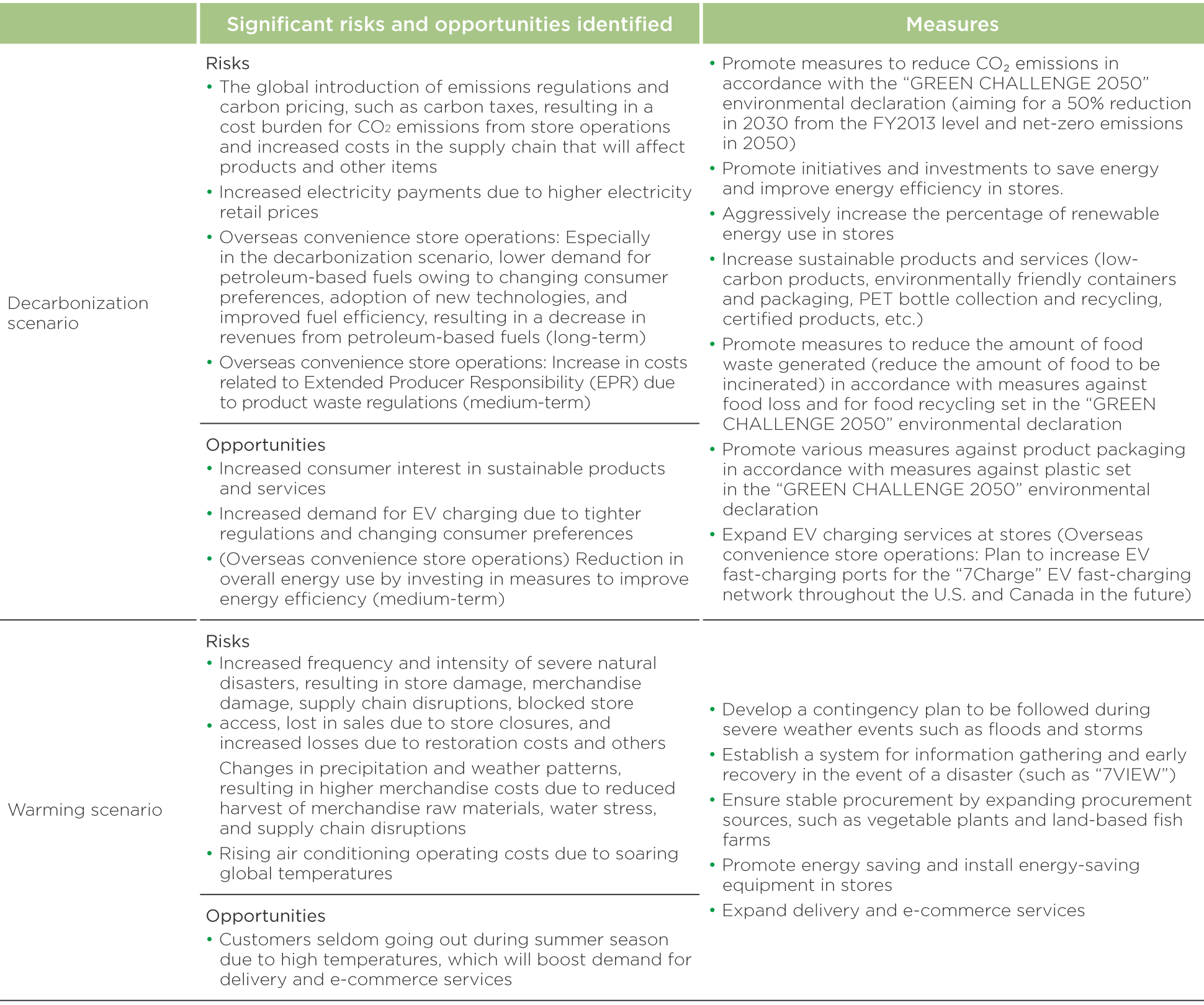
Significant transition risks and countermeasures: Decarbonization scenario (1.5°C–2.0°C)
【Significant transition risk: The carbon tax impact】
Transition risks were considered based on the decarbonization scenario in which various regulations and other measures are introduced to achieve the 1.5°C target. Of these, for each business entity we analyzed the impact of the carbon tax through the introduction of carbon pricing, which is projected to have the biggest impact. The following is an explanation of the expected impact on the domestic convenience store operations and superstore operations.
● Carbon tax impact (2030)
| Item | Business impact |
| Domestic CVS operations | ¥12.6 billion |
| Overseas CVS operations | ¥13.3 billion |
| SST operations | ¥7.4 billion |
| Total amount of business impact | ¥33.3 billion |
Assumption:
Carbon tax: $135/ton-CO2 (Maximum amount given in the IEA’s World Energy Outlook 2022)
Foreign exchange rate: ¥131.62/$ (Rate used in financial statements for the term ended February 2023)
For our estimate, with reference to the IEA’s World Energy Outlook 2022, we calculated the impact of carbon tax at the maximum amount of $135/ton-CO2 as of 2030. By putting our shoulders to the wheel to promote initiatives based on the targets outlined in our “GREEN CHALLENGE 2050” environmental declaration, we can substantially reduce the carbon tax burden in 2030. Furthermore, by achieving our 2050 target of net zero CO2 emissions, we expect that eventually the carbon tax burden will be eliminated altogether.
【Main countermeasures for a decarbonization scenario】
As approximately 90% of the Group’s CO2 emissions are attributable to electricity use from store operations, the three initiatives of energy savings, energy generation, and procurement of renewable energy are being pursued to reduce emissions. We also aim to reduce emissions throughout the supply chain, including Scope 3 emissions.
(1) Energy savings
Reduction of electricity use through employees’ efforts to save energy and the adoption of energy-saving equipment
(2) Energy generation
Onsite solar panels have been installed, with the electricity thus generated also consumed in-house. Solar panels have been installed at more than 9,000 Group stores and will be installed in 11,000 Group stores by 2030.
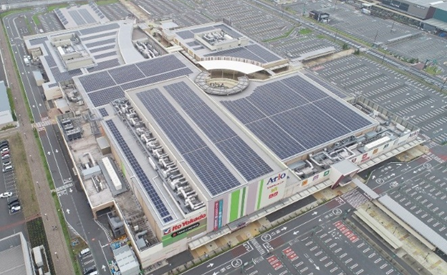
Rooftop solar panels (Ario Ichihara store)
After reducing CO2 emissions at stores as much as possible through energy savings and energy generation, we will use procurement of renewable energy from offsite sources to further reduce emissions.
(3) Procurement of renewable energy
We are expanding cooperation with various electric power companies, including an offsite power purchase agreement (PPA) with the Hokuriku Electric Power Group.
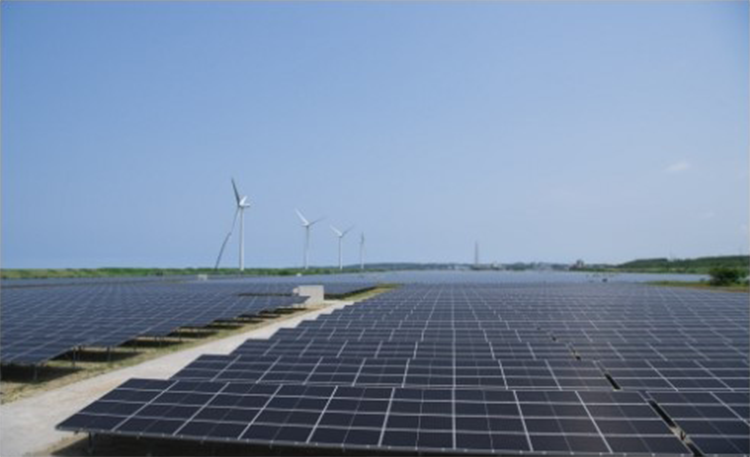
Offsite PPA with the Hokuriku Electric Power Group
In addition, we have established the business scheme of a “Circular Model Project for Retail Supply Chain Decarbonization in the Use of Renewable Energy*” in collaboration with food product manufacturers, logistics companies, and others, and have commenced demonstration experiments, as an initiative to reduce CO2 emissions.
*Selected for the “Technology Development Support Project for the Promotion of New Energy,” implemented by the Tokyo Metropolitan Government and the Tokyo Environmental Public Service Corporation, this project will demonstrate energy management using “renewable energy,” including EV trucks, solar power, and biogas power generation, based at Seven & i Group stores in Tokyo as well as at food-processing factories and logistics centers of business partners.
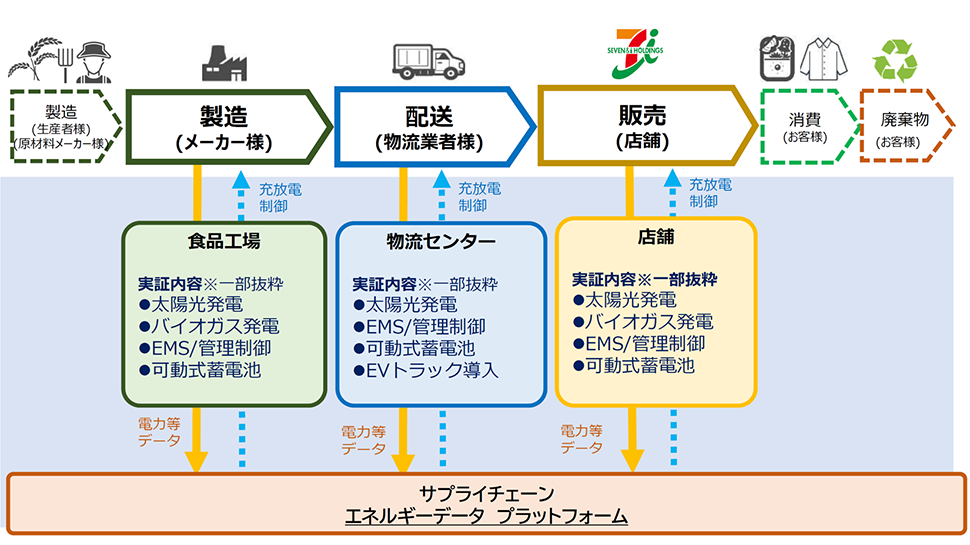
【Website and other information related to countermeasures】
Significant physical risks and countermeasures: Warming scenario (2.7°C–4.0°C)
【Significant physical risks: Damage from natural disasters】
In terms of physical risks, natural disasters caused by extreme weather pose the greatest risk. It is difficult to predict when and where natural disasters will occur, and once they do, they can cause extensive damage. We are basing countermeasures for each business on the premise that weather phenomena such as heavy rainfall and flood will occur with greater frequency and intensity and cause increasingly worse natural disasters such as flooding, so we estimate the impact of losses due to store and merchandise damage, loss of sales due to store closures, restoration costs, etc., to inform those countermeasures.
Impact on Seven-Eleven Japan stores (domestic convenience store operations)
Assumption: The amount of damage is estimated for flood damage to stores in the Tokyo metropolitan area (assuming flooding of the Arakawa River) as of 2030
* Estimated based on past flood damage
* To ascertain the extent of damage, estimates are made without considering insurance coverage
| Item | Business impact |
| Store damage, merchandise damage, loss of sales due to closures, restoration cost, etc. | ¥11.2 billion |
Impact on Ito-Yokado and York-Benimaru (superstore operations)
Assumption: The amount of damage as of 2030 is estimated assuming a disaster of similar scale to 2019 (Typhoon No. 19).
* Estimates are based on actual damage from the 2019 disaster and forecasts of an increased frequency of disasters and floods
* To ascertain the extent of damage, estimates are made without considering insurance coverage
| Item | Business impact |
| Store damage, merchandise damage, loss of sales due to closures, restoration cost, etc. | ¥5.5 billion |
【Main countermeasures to damage from natural disasters】
Seven & i Holdings will strive to quickly reopen its stores and establishments in the event of a natural disaster as part of enhanced disaster response to continue serving as regional relief bases for local customers offering infrastructure, evacuation locations, etc. The following measures are being taken to address the increasing risk of natural disasters.
・Establish early recovery systems (such as 7VIEW)
・Continue operations in the event of a disaster with “Phase Free (a concept of securing an adequate quality of life, regardless of phases such as daily life and emergencies)” facilities, including improved performance of storage batteries and preparation of fuel reserves for emergency supply delivery
・Create a strategy and stores that anticipates flooding (preventing flood damage by expanding the installation of watertight panels and guard pipes)
・Establish disaster-resilient logistics bases and supply networks
・Develop disaster bases utilizing store infrastructure through disaster management agreements, etc.
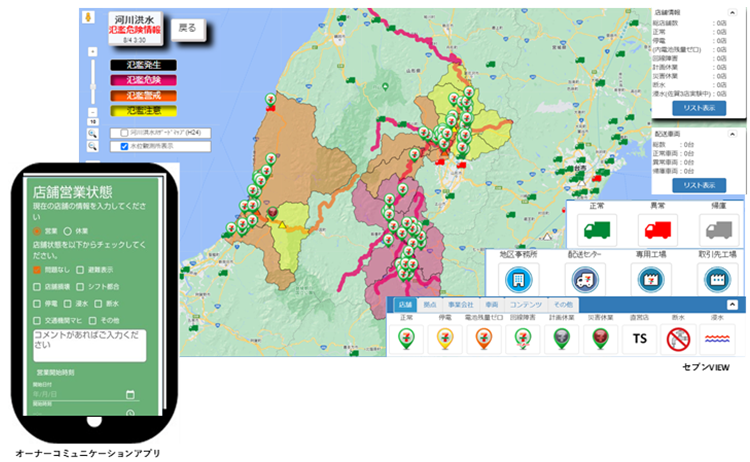
7VIEW (system for sharing information in the event of a disaster)
Number of comprehensive alliance agreements with local governments (by operating company)
| End of February 2022 | End of February 2023 | End of February 2024 | |
| Seven-Eleven Japan | 223 | 230 | 235 |
| Ito-Yokado | 77 | 78 | 80 |
| York-Benimaru | 11 | 14 | 16 |
| Seven & i Food Systems | 3 | 3 | 3 |
| Total | 314 | 325 | 334 |
【Website and other information related to countermeasures】
【Significant physical risks: Increase in raw material cost due to changes in weather patterns】
Assuming that climate change will lower harvest yields for raw materials and increase the purchase price accordingly, we foresee a significant financial impact on our business entities. For both domestic convenience store and superstore operations, the raw materials selected for analysis were chosen on the basis of the composition of purchase price and availability of future information. (Targets of analysis will be expanded in the future.)
Impact on Seven-Eleven Japan stores (domestic convenience store operations)
| Item | Business impact |
| Domestic convenience store operations Raw materials cost increase for rice, laver, and livestock products | ¥5.7 billion |
Assumption: Estimated increases in raw material costs as of the fiscal year ending February 28, 2031 due solely to lower yields resulting from climate change
* Yield changes are estimated from data provided by the Ministry of Education, Culture, Sports, Science and Technology; the Ministry of the Environment; the Japan Meteorological Agency; the National Institute for Environmental Studies; the National Agriculture and Food Research Organization, etc.
【Main countermeasures to increase in raw material costs due to changes in weather patterns】
Under our environmental declaration “GREEN CHALLENGE 2050,” we set sustainable procurement as a specific theme—ensuring that food ingredients used in our original products are guaranteed sustainable, and we are taking the following measures with our suppliers to work toward a society that is in harmony with nature.
・Expand the lineup of eco-certified marine products (MSC, ASC, MEL, etc.) and eco-certified agricultural products (GAP, etc.)
・Disperse and consolidate production sites of raw materials
・Utilize digital technology and AI
・Ensure stable procurement through the expansion of raw material procurement from weather-resistant sources, such as vegetable factories, land-based aquaculture, etc.
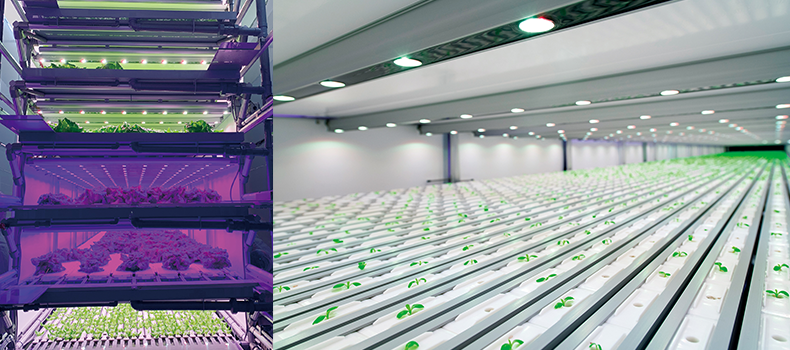
Indoor vegetable factory exclusively for Seven-Eleven Sagamihara Vegetable Plant by Prime Delica Co., Ltd.
【Website and other information related to countermeasures】
<Business opportunities and main countermeasures for both scenarios>
【Business opportunities for the decarbonization scenario】
In this scenario, we see changes in consumer awareness as a major business opportunity. As consumers develop a strong interest in sustainable products and services in line with government policy and trends toward carbon neutrality, we believe that our current efforts will lead to opportunities and further accelerate those efforts. For example, we are promoting related initiatives as part of our environmental declaration “GREEN CHALLENGE 2050.”
・Initiatives in consideration of the environment with “Seven Premium”
“Seven Premium,” the private brand for the entire Group, is engaged in developing products that are both high in quality and environmentally friendly. We are actively promoting eco-friendly products at the Group’s stores to generate awareness of such products and create opportunities for customers to consider the environment with us in a way that may lead to action.
【Website and other information related to countermeasures】
【Business opportunities for the warming scenario】
In this scenario, we see changes in customer preferences and consumer behavior due to rising temperatures as business opportunities in the following ways.
・Consumers’ heightened awareness of disaster mitigation will increase demand for disaster preparedness products
・Increased sales of products that people wish to have in hot weather (cooling products)
・The frequency of outings will decrease caused in hot weather, so e-commerce services such as delivery business will flourish
Governance Related to Climate Change
The Seven & i Group considers the issue of climate change to be one of the most important issues to be tackled across the Group companies. We have therefore established a governance structure centered on the Sustainability Committee and supervised by the Board of Directors.
The Board of Directors receives reporting from the Sustainability Development Office that is a secretariat for the Sustainability Committee on our efforts for sustainability including climate change issues at least once a year, supervises their progress and the status of achieving the goal, and reviews our policies and efforts as appropriate. In December 2020 and May 2021, the Board of Directors made a resolution to revise our CO2 emission reduction target in our environmental declaration “GREEN CHALLENGE 2050” to 50% by 2030 and zero emission by 2050 in line with current international trends aiming at the 1.5 °C target and the decision of the Government of Japan for the net zero goal in 2050. In addition, we have added a target of reducing CO2 emissions set in the environmental declaration “GREEN CHALLENGE 2050” that was formulated in May 2019 to the key performance indicator (KPI) for stock-based compensation as a non-financial indicator in compensation of Directors since fiscal year ended February 28, 2021. In addition, in order to accelerate decarbonization efforts, the Board of Directors decided in 2023 to invest in the public-private fund “Japan Green Investment Corp. for Carbon Neutrality (JICN).”
* For the target level of the amount of CO2 emissions for each fiscal year as the KPI for the stock-based compensation, it will be the target level for each fiscal year calculated based on the assumption of the actual amount of emission for the fiscal year ended February 28, 2019 to be equally reduced for each fiscal year to achieve the target level for the fiscal year ending February 28, 2031 (reducing emissions from Group store operations by 50% compared to the fiscal year ended February 28, 2014).
The Sustainability Committee, chaired by Representative Director and Executive Chair of Seven & i Holdings, meets twice a year, attended by CSR managers from Group companies (Representative Director and President, etc.) and managers from related divisions at Seven & i Holdings. Under the Sustainability Committee, the Environment Subcommittee has been established as a subcommittee to deal with climate change issues. The Environment Subcommittee consists of managers from the environmental departments of operating companies. In addition, when we announced the environmental declaration “GREEN CHALLENGE 2050” in May 2019, we established CO2 Emissions Reduction Team to create innovations across the Group to reduce CO2 emissions. This team is headed by executive officers or higher from responsible departments at our main operating companies.
The Sustainability Committee receives reports on trends in indicators related to climate change issues, such as CO2 emissions, and on initiatives mainly for mitigation measures. The Committee approves measures implemented by the subcommittees and each group company, and provides necessary advice. The progress of such sustainability-related initiatives, including those related to climate change, is reported to the Board of Directors at least once a year.
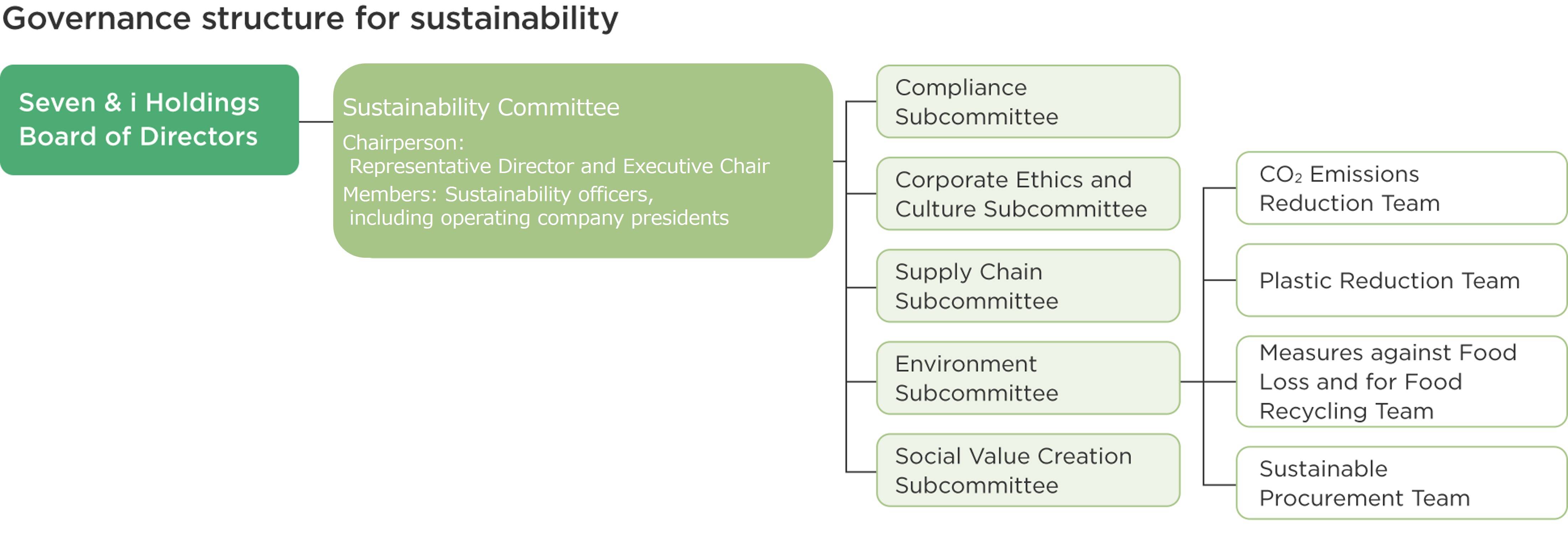
●Meetings and roles related to climate change
| Meeting | Role | Member |
| Board of Directors |
|
Members include internal and Outside Directors with extensive knowledge and experience in sustainability |
| Sustainability Committee |
|
|
| Environment Subcommittee |
|
|
Risk Management
In accordance with the basic rules for risk management, the Company and Group companies establish, streamline, and manage comprehensive risk management systems, centered on the Risk Management Committee, in order to properly analyze, evaluate, and appropriately respond to risks associated with each business, with consideration for changes in the management environment and risk factors. Risks related to climate change are managed under this comprehensive risk management system as well.
The Risk Management Committee receives reports on the risk management status of the respective companies from the departments responsible for the management of risks, to comprehensively identify, assess, and analyze risks and discuss measures, and to determine the future direction going forward. In principle, the status of risk management is reported to the Seven & i Holdings Board of Directors once annually. In recent years, in addition to changes in the Group's internal environment, the impact of various changes in the external environment on business operations, including heightened risks related to climate change such as CO2 emission regulations, recent large-scale typhoons, and changes in growing regions and fishing grounds for product raw materials, has grown significantly.
In order to address these changes, the Company reviewed its risk management framework to not only account for short-term risks but also to consider medium- to long-term risks.
In the risk assessment process, in terms of the assessment perspective of the degree of impact on performance arising from the emergence of risk, by adding the qualitative factors such as business continuity, damage to the Group's brand image, and other factors to the quantitative factors previously considered, we seek to take a more multifaceted and sophisticated approach to assessment and analysis of all risks.
In addition, we are enhancing the effectiveness of risk management for the Group as a whole by identifying high-priority risks from the perspectives of significance, commonality, etc., and clarifying the roles and responsibilities of the Company and Group companies.
Future Responses to TCFD Recommendations
Going forward, we will update our scenario analyses in line with the state of the world and increase the number of operating companies subject to analysis, both domestically and overseas. We will take into account the entire supply chain as we continue to quantitatively identify risks and opportunities and develop and implement practical countermeasures.
We will work on initiatives to limit the global temperature increase to less than 1.5°C by 2100, thereby leaving a prospering planetary environment to future generations.
